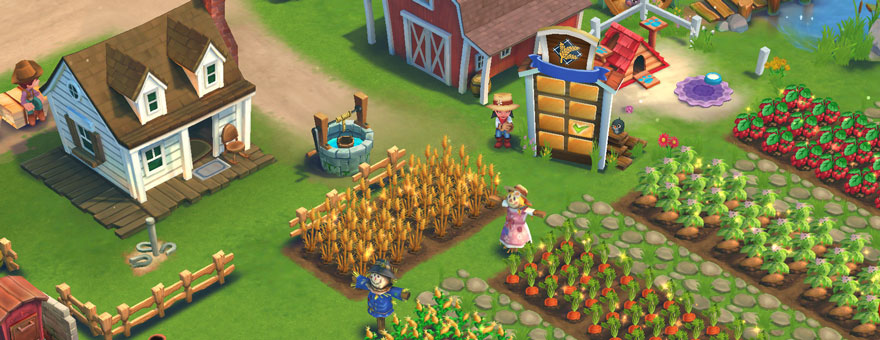
Zynga: From Farmville and Beyond

Rarely will you find someone who has ever used Facebook not know what FarmVille is. In fact, to many, FarmVille is almost synonymous with Facebook and for so many years, millions of Facebook users have been actively engaged in the FarmVille phenomenon. After all, planting crops, raising animals, cultivating the land, and selling the product has this addictive effect to the majority of peace-loving on-line users who would rather spend their time simulating entrepreneurship than shooting each other to kingdom come.
Yes, Farmville which came out in 2009 was the game that (although didn't really start the ball rolling) made the strongest impact in the free2play social media online platform contributing hugely to the shaping of the social media sector and industry in the years that followed.
All of this began with a then start-up company called Presidio Media run by a guy named Mark Pincus who in 2007 made a deal with Facebook to upload developed games onto the social media platform for its users to play with should they have the need for some diversion while being connected online. Pincus then changed the name of his company to Zynga in memory of his beloved pet bulldog and in July of that year uploaded their first game onto the Facebook platform. It was actually a still somewhat obscure poker game called Texas Hold'em Poker which would eventually grow to the hugely played Zynga Poker of the coming years.

In 2008, Zynga uploaded its second game called Mafia Wars, a multi-player gangland simulation which at that time became quite popular winning the 2009 People's Voice Webby Award in the Games category. 2009 however was the year that made Zynga sort of a Facebook user household name. The company uploaded FarmVille in August of that year and the rest became history. The game was the first ever to reach 10 million daily active users (DAU) on Facebook and continued growing by the time a sequel FarmVille 2 was uploaded. By 2010, Farmville had over 80 million players that in May of that year both Facebook and Zynga signed a special five-year deal to have facebook credits in Zynga's games.

The company didn't stop with Farmville and released a spin-off called CityVille which at that time edged over FarmVille in popularity that by 2011 Zynga had around 206 million monthly active users. Of course, financially, the company was continually growing as it was able to hire more employees and acquire more valuable assets. By 2012, the company launched its own online network called "Zynga with Friends" which connected its users playing different Zynga games on different mobile devices. Also, due to its popularity, FarmVille became Zynga's first stand-alone title and by 2013, Zynga ended its a special agreement with Facebook even though the company practically depended on the platform for most of its earnings. Zynga was decided to move on with its own trademark.
2013 was not to good for the company as FarmVille, it's spin-offs and sequels had started to lose their appeal in the social gaming world. The company started to face a major crisis in its life cycle and had to adapt to some huge changes with respect to its workforce, location, and resources in order to survive. From that point on, it became evident that the company had to adapt to the huge shift in the use of mobile platforms as an alternative to the old and usual computer-based platform model. What could be done on a PC connected online could now usually be done on a mobile device which in most cases was a more sensible and convenient alternative. Also, mobile gaming was growing at an exponential rate.
From 2014 to the present, Zynga had to adopt a strategy which sadly would move it's development away from the old social media PC based platform into the growing mobile social gaming market. This meant a focus on the acquisition of development houses or teams and the games being developed. This then is plowed into what Zynga calls as forever franchises, currently existing games, and those in development which currently have the performance to deliver at least $100 million per annum in bookings or have the strongly predicted potential to do so.
Zynga has to be quite strict and decisive with these metrics in order to ensure continued success and growth. Company acquisitions include British development house NaturalMotion in 2014 with both Gram Games with the game Merge Dragons and Small Giant Games and their game Empires & Puzzles in 2017. The current strength of both games was used to bolster Zynga's line of games. NaturalMotion has been busy developing hit titles since 2014 with the car simulation game CSR/CSR2 continually hitting the road. By far, the word puzzle (scrabble like) game Words With Friends and it's sequel are the most popularly being played worldwide.

Zynga uses the free2play business model so things like in-game purchases of credits, items, features, and the like apply to most of their games. It is widely known in the mobile gaming industry as well on the online free2play PC market that the business model itself in all it's modified variations has become the de facto standard in the online game industry of course with the exception of the more traditional AAA titles from the old vanguard game houses like Valve, UbiSoft, EA, Sony, Microsoft and the like.

Zynga is at the forefront of the mobile game industry with teams located the world over from Helsinki to Istanbul continually developing, creating, and coming up with new concepts in mobile gaming. Under the guidance of current CEO Frank Gibeau, the future is wide open for Zynga as it turns in a new leaf with renewed strength. Zynga intends to push forward into the global gaming future by linking the world community together through online mobile gaming.
As for FarmVille, who knows, we may be seeing more of it in the future.














